
Diah Permata Megawati Setiawati Sukarnoputri is an Indonesian politician who served as the fifth president of Indonesia from 2001 to 2004. She previously served as the eighth vice president from 1999 to 2001.

Abdurrahman Wahid, though more colloquially known as Gus Dur, was an Indonesian politician and Islamic religious leader who served as the 4th president of Indonesia, from his election in 1999 until he was removed from office in 2001. A long time leader within the Nahdlatul Ulama organization, he was the founder of the National Awakening Party (PKB). He was the son of Minister of Religious Affairs Wahid Hasyim, and the grandson of Nahdatul Ulama founder Hasyim Asy'ari. He had a visual impairment caused by glaucoma, he was blind in the left eye and partially blind in his right eye. He was the first and to date the only president of Indonesia to have had physical disabilities.
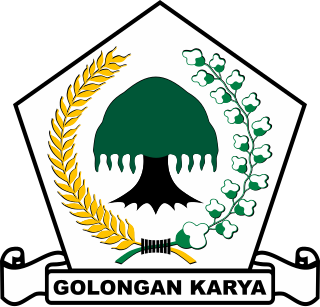
The Party of Functional Groups, often known by its abbreviation Golkar, is a political party in Indonesia. It was founded as the Joint Secretariat of Functional Groups in 1964, and participated for the first time in national elections in 1971 as Functional Groups. Golkar was not officially a political party until 1999, when it was required to become a party in order to contest elections.

The United Development Party is an Islamist political party in Indonesia. Due to its distinctive logo, the party is known as the "Kaaba Party".
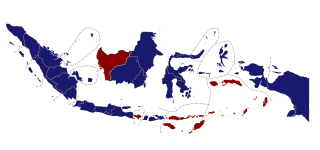
Presidential elections were held in Indonesia on 5 July and 20 September 2004. As no candidate won a majority in the first round, a runoff was held, in which Susilo Bambang Yudhoyono defeated Megawati Sukarnoputri and was elected president. They were the first direct presidential elections in the history of Indonesia; prior to a 2002 amendment to the Constitution of Indonesia, both the president and vice president had been elected by the People's Consultative Assembly (MPR).

Wiranto is an Indonesian politician and retired army general, who is serving as the chairman of the Presidential Advisory Council, since December 2019. Previously, he was the Commander of the Indonesian Armed Forces from February 1998 to October 1999 during Indonesia's transition from authoritarian rule to democracy, he ran unsuccessfully for President of Indonesia in 2004 and for the vice-presidency in 2009. On 27 July 2016, Wiranto was appointed Coordinating Minister for Political, Legal, and Security Affairs, replacing Luhut Binsar Panjaitan.
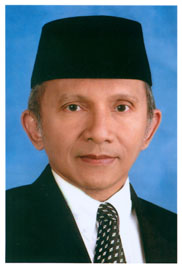
Muhammad Amien Rais is an Indonesian politician. He was one of the leaders of the reform movement that forced the resignation of President Suharto in 1998. Amien Rais was the leader of Muhammadiyah, one of the two biggest Muslim organizations in Indonesia, from 1995 to 2000. He was the Chairman of the People's Consultative Assembly (MPR) from 1999 to 2004. During his chairmanship, the MPR passed a series of amendments to the Constitution of Indonesia. These amendments, among other things, established direct presidential elections, a presidential term limit, and the Constitutional Court.
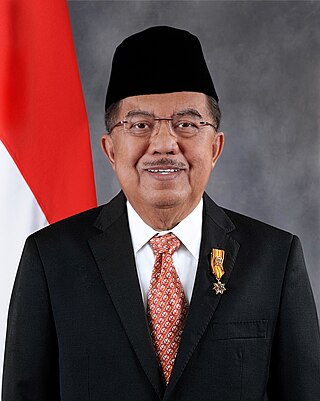
Muhammad Jusuf Kalla is an Indonesian politician and businessman who served as the 10th and 12th vice president of Indonesia, the only vice president in Indonesian history to serve two non-consecutive terms in office. He was unsuccessful as Golkar's presidential nominee in the 2009 presidential election. Before Kalla declared himself as the running mate for Joko Widodo in the 2014 presidential election, a 2012 poll placed his popularity among likely voters in the top three contenders for the presidency and ahead of his own party's nominee Aburizal Bakrie.

The National Mandate Party, frequently abbreviated to PAN, is an Islam-based political party in Indonesia.

The Crescent Star Party is a political party in Indonesia.

The Post-Suharto era is the contemporary history in Indonesia, which began with the resignation of authoritarian president Suharto on 21 May 1998. Since his resignation, the country has been in a period of transition known as the Reform era. This period has been characterised by a more open political-social environment and grassroots economic improvement.

Sutiyoso is an Indonesian politician and former general who served as the Director of the State Intelligence Agency from July 2015 to September 2016. Known informally as 'Bang Yos', he also served as the governor of Jakarta, the country's capital, during a turbulent political period from 1997 to 2007. During this time there was a total of five presidents in Indonesia. The transitions between presidents were often accompanied by much turmoil and disturbance in the streets of Jakarta. Sutiyoso also served as chairman of the Badminton Association of Indonesia (PBSI) for the period 2004–2008.

The Fifth Development Cabinet was the Indonesian cabinet which served under President Suharto and Vice President Sudharmono from March 1988 until March 1993. The cabinet was formed after Suharto was elected to a 5th term as president by the People's Consultative Assembly (MPR).

The National Unity Cabinet was the Indonesian Cabinet which served under President Abdurrahman Wahid and Vice President Megawati Sukarnoputri from 29 October 1999 until 23 July 2001. The Cabinet was formed after Wahid and Megawati were elected President and Vice President by the People's Consultative Assembly (MPR). The Cabinet was originally designed to look after the interests of the various political parties and the Indonesian National Armed Forces but this notion quickly disappeared as Wahid's presidency began to break down.

Fahmi Idris was an Indonesian prominent businessman and politician. He was an Indonesian government minister under the Habibie and Yudhoyono presidencies. He received a doctorate title from University of Indonesia as well as appointed a Honorary Professor at State University of Padang.
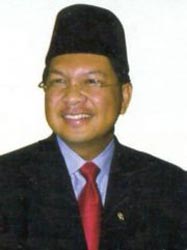
Laksamana Sukardi is an Indonesian politician, reformist and banker who served as Minister of State Owned Enterprises (BUMN) under the presidencies of Abdurrahman Wahid and Megawati Sukarnoputri.
From 20 to 21 October 1999, the People's Consultative Assembly (MPR), the legislative branch of Indonesia, met to elect both the president and vice president of the country for a five-year term. The incumbent president, B. J. Habibie, declined to stand for election. On 20 October, Abdurrahman Wahid, chairman of the Nahdlatul Ulama, was elected president and inaugurated on the same day. Wahid's opponent, Megawati Sukarnoputri was subsequently elected vice president the next day. The elections represented the first relatively democratic and peaceful transfer of power in the history of Indonesia.
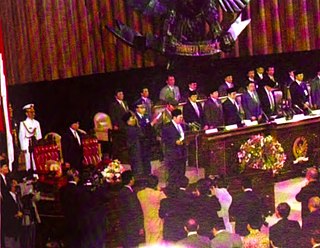
The inauguration of Abdurrahman Wahid as the fourth president of Indonesia took place on Wednesday, 20 October 1999 at the DPR/MPR Building, Jakarta. The ceremony marked the commencement of Wahid's only term as president.

The Onward Indonesia Coalition is an official political coalition in Indonesia that supported the presidential/vice presidential candidates Joko Widodo and Ma'ruf Amin in the 2019 presidential election. It was initially known as the Working Indonesia Coalition, founded in 2018. The coalition is currently utilized as the government of President Joko Widodo.


















